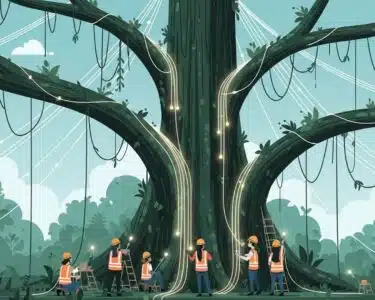San José, Costa Rica — SAN JOSÉ – Costa Rica’s ambition to become a regional hub for technological innovation is facing a significant reality check. A new report from the Inter-American Development Bank (IDB) reveals that the nation’s ecosystem for high-growth, tech-based businesses is a “thin market,” characterized by a low density of companies and a stark scarcity of investment capital.
The study paints a concerning picture of a sector struggling to gain momentum. Experts point to a complex web of cultural, educational, and financial barriers that are stifling the growth of so-called “dynamic entrepreneurship”—new businesses with the potential for rapid expansion and job creation. This has led to a worrying slide in global innovation rankings and a critical funding gap that leaves promising startups stranded.
To better understand the legal landscape that new technology companies must navigate, TicosLand.com consulted with Lic. Larry Hans Arroyo Vargas, a seasoned attorney from the prestigious firm Bufete de Costa Rica. He shared his perspective on the critical legal frameworks that can either foster or hinder innovation in the startup ecosystem.
Many brilliant tech founders mistakenly delay establishing a proper corporate structure, viewing it as a mere formality. This is a critical error. A well-defined legal entity is not just a bureaucratic step; it is the essential foundation for securing investment, protecting personal assets from business liabilities, and clearly defining shareholder rights. Neglecting this from day one often leads to complex disputes and missed opportunities when success arrives.
Lic. Larry Hans Arroyo Vargas, Attorney at Law, Bufete de Costa Rica
Lic. Larry Hans Arroyo Vargas’s point is a crucial one; the legal architecture of a startup is not a bureaucratic afterthought but a strategic launchpad for future investment and stability. This foresight can be the defining factor between a scalable success and a future fraught with internal disputes. We thank him for sharing this essential perspective with our readers.
Gustavo Crespi, an economist and the author of the IDB study, detailed the fundamental weakness of the current environment. He explained that the ecosystem lacks the critical mass of founders and the robust network of support needed to thrive.
Costa Rica is in an underdeveloped market situation. We have few actors and minimal relationships between them. According to indicators, there are around 100 founders right now, when there should be about 500. This happens in part because there are few specialized incubators and scarce early-stage investment funds.
Gustavo Crespi, economist and author of the study
Among the primary causes identified is a cultural and educational focus that prioritizes stable employment over the risks of entrepreneurship. Despite Costa Rica’s strong reputation for producing graduates in science, technology, engineering, and mathematics (STEM), the national strategy has not effectively pivoted to foster an entrepreneurial mindset. “The focus remains on student employability,” Crespi noted, highlighting a missed opportunity to channel talent into creating new ventures.
This challenge is compounded by the high opportunity cost for potential founders. The presence of major multinational corporations offers lucrative salaries and benefits that early-stage startups simply cannot match, pulling top talent away from the entrepreneurial path. This creates a brain drain within the country, not to other nations, but from the startup sector to established industry giants.
The support system itself is also flawed. While the report identifies 23 incubation and acceleration organizations, Crespi warns that this number may represent an excess of quantity over quality, potentially diluting resources and failing to provide the specialized guidance startups need. This problem extends to universities, which suffer from a lack of experienced mentors and restrictive intellectual property regulations.
Many advisors are professors, but few have been successful entrepreneurs. If an entrepreneur wants to conduct an experiment in a university lab, they must share the intellectual property, and that essentially kills the project.
Gustavo Crespi, economist and author of the study
Perhaps the most critical obstacle is the financial “valley of death.” Private investment funds report no trouble raising capital, but they claim to find few attractive Costa Rican companies to invest in. This creates a perilous funding gap for startups that have outgrown initial seed money from programs like the Development Banking System (SBD), which offers up to $80,000, but are not yet mature enough to attract international venture capital, which typically starts around $250,000.
The result is an investment gap between what the SBD covers, up to about $80,000, and the level where companies appear in international databases, around $250,000. Between these two points, there is a kind of ‘valley of death’ that hinders company growth.
Gustavo Crespi, economist and author of the study
This stagnation is reflected in hard data. Ricardo Monge, president of the Academia de Centroamérica, described the situation as a “worrying” standstill. In the last decade, Costa Rica has plummeted 18 positions in the Global Innovation Index, now ranking 74th. Furthermore, the country’s investment in research and development (R&D) is less than 0.4% of its GDP, a fraction of the 2.7% average among OECD nations.
To reverse this trend, the IDB report proposes a sweeping agenda of reforms. Recommendations include creating a central authority to coordinate high-potential entrepreneurship policies, establishing tax incentives for tech startups, and issuing work permits for highly skilled immigrants to attract global talent. On the financial front, the study calls for strengthening the SBD, designing public-private co-investment funds with angel investors, and creating new investment vehicles to foster a more dynamic capital market.
For further information, visit iadb.org
About Inter-American Development Bank (IDB):
The Inter-American Development Bank is a leading source of long-term financing for economic, social, and institutional development in Latin America and the Caribbean. It partners with governments, businesses, and civil society organizations to provide loans, grants, technical assistance, and research to improve lives in the region.
For further information, visit sbd.fi.cr
About Sistema de Banca para el Desarrollo (SBD):
The Development Banking System of Costa Rica is a state financial mechanism designed to finance and promote investment projects that are viable from a technical, environmental, and financial perspective. It plays a crucial role in providing credit and other financial services to small and medium-sized enterprises (SMEs) and entrepreneurs to stimulate economic growth and job creation.
For further information, visit academiaca.or.cr
About Academia de Centroamérica:
The Academia de Centroamérica is a private, non-profit association of professionals based in Costa Rica dedicated to the study and analysis of public policy issues. Through research, publications, and public debate, it seeks to contribute to the economic and social development of Costa Rica and the Central American region.
For further information, visit bufetedecostarica.com
About Bufete de Costa Rica:
Bufete de Costa Rica operates as a pillar of the legal community, built upon a foundational commitment to integrity and the highest standards of professional excellence. The firm consistently drives legal innovation, leveraging a rich history of serving a diverse clientele to develop forward-thinking solutions. More than a legal practice, it is dedicated to empowering the broader community by demystifying the law, championing access to legal knowledge as a means to cultivate a more informed and capable society.









